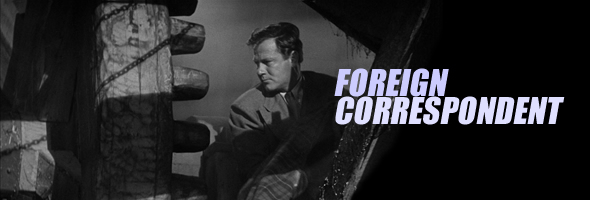

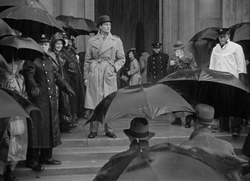
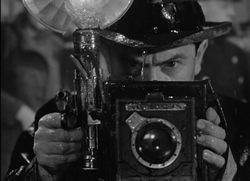 Rebecca won a Best Picture Oscar in 1941, he had another film in contention against it: Foreign Correspondent, a far more typical thriller from the Master of Suspense. Recently relocated to America and anxious about his native country's vulnerability to the German forces stamping across Europe, Hitchcock found a way to make a statement about the need for America to join the fight while also offering the first American version of his beloved man on the run scenario, already perfected in its British form in The 39 Steps. The film would also prove to be a harbinger of things to come from the director, who dabbled in war-themed short films and chronicled the evolution of the conflict in Saboteur and Lifeboat, followed by a perverse look at its aftermath in Notorious.
Rebecca won a Best Picture Oscar in 1941, he had another film in contention against it: Foreign Correspondent, a far more typical thriller from the Master of Suspense. Recently relocated to America and anxious about his native country's vulnerability to the German forces stamping across Europe, Hitchcock found a way to make a statement about the need for America to join the fight while also offering the first American version of his beloved man on the run scenario, already perfected in its British form in The 39 Steps. The film would also prove to be a harbinger of things to come from the director, who dabbled in war-themed short films and chronicled the evolution of the conflict in Saboteur and Lifeboat, followed by a perverse look at its aftermath in Notorious. 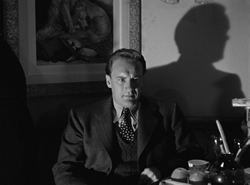 takes off into the rain surrounded by a crowd of umbrellas, but Jones tails him to the countryside where, along with Fisher and a British correspondent named ffolliott (Sanders), he uncovers a startling
takes off into the rain surrounded by a crowd of umbrellas, but Jones tails him to the countryside where, along with Fisher and a British correspondent named ffolliott (Sanders), he uncovers a startling 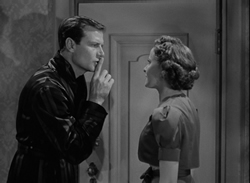 twist and becomes embroiled in a deadly plot to undermine the stability of the Western world.
twist and becomes embroiled in a deadly plot to undermine the stability of the Western world. 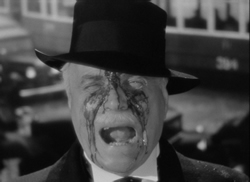 The packaging touts an HD transfer in 2K from the original camera negative, and indeed, it's quite a beauty. Damage is essentially nonexistent, detail is perfect, and the rich, deep blacks add immeasurably to the fim's impact, especially a nifty rooftop escape scene that would later get tweaked in Hitch's To Catch a Thief. The PCM mono track also sounds great, with the formerly muffled and tinny moments in the dialogue now coming through far more clearly. The
The packaging touts an HD transfer in 2K from the original camera negative, and indeed, it's quite a beauty. Damage is essentially nonexistent, detail is perfect, and the rich, deep blacks add immeasurably to the fim's impact, especially a nifty rooftop escape scene that would later get tweaked in Hitch's To Catch a Thief. The PCM mono track also sounds great, with the formerly muffled and tinny moments in the dialogue now coming through far more clearly. The 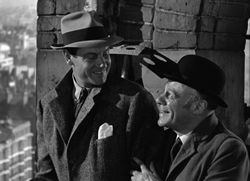 trailer reappears here, and the new extras kick off with "Hollywood Propaganda and World War II," in which Mark Harris dissects the role of propaganda in the more progressive mode of the U.S. government at the time and the attempts by United Artists and Wanger to make films with more topical urgency. The film's final scene was famously added to urge viewers and nations to action, but Harris is understandably ambivalent about sticking the entire film under that label. In the 19-minute "Visual Effects in Foreign Correspondent," visual effects expert Craig Barron (a familiar face from many Los Angeles events) walks through Hitchcock's collaboration on this film with the inventive William Cameron Menzies, the man behind such films as Things to Come and Invaders from Mars. Rear projection, matte paintings, and other tricks of the trade are dissected here, including a nifty look at that amazing plane crash. A 1972 interview with Hitchcock from The Dick Cavett Show runs a full hour (including a newer video intro with the host), with the director talking about his methods more generally including such familiar topics as the MacGuffin, difficulties with actors, the infamous bomb outrage in Sabotage, and his utter lack of interest in making westerns or costume movies. A very hurried 25-minute radio production from 1946's Academy Award Theater features Joseph Cotten zipping through the highlights of the story, while "Have You Heard? The Story of Wartime Rumors" is an unusual Life magazine drama Hitchcock conceived with stills showing how idle American chatter can undermine national security. Finally the set rounds out with "The Windmills of War," a liner notes essay by James Naremore covering the film's genesis with a real reporter's memoir, the involvement of other writers in script including Robert Benchley (who has a significant supporting role in the film), and the ambitious production of the film itself, which remains a model lesson in how to keep your audience tightly coiled for two solid hours.
trailer reappears here, and the new extras kick off with "Hollywood Propaganda and World War II," in which Mark Harris dissects the role of propaganda in the more progressive mode of the U.S. government at the time and the attempts by United Artists and Wanger to make films with more topical urgency. The film's final scene was famously added to urge viewers and nations to action, but Harris is understandably ambivalent about sticking the entire film under that label. In the 19-minute "Visual Effects in Foreign Correspondent," visual effects expert Craig Barron (a familiar face from many Los Angeles events) walks through Hitchcock's collaboration on this film with the inventive William Cameron Menzies, the man behind such films as Things to Come and Invaders from Mars. Rear projection, matte paintings, and other tricks of the trade are dissected here, including a nifty look at that amazing plane crash. A 1972 interview with Hitchcock from The Dick Cavett Show runs a full hour (including a newer video intro with the host), with the director talking about his methods more generally including such familiar topics as the MacGuffin, difficulties with actors, the infamous bomb outrage in Sabotage, and his utter lack of interest in making westerns or costume movies. A very hurried 25-minute radio production from 1946's Academy Award Theater features Joseph Cotten zipping through the highlights of the story, while "Have You Heard? The Story of Wartime Rumors" is an unusual Life magazine drama Hitchcock conceived with stills showing how idle American chatter can undermine national security. Finally the set rounds out with "The Windmills of War," a liner notes essay by James Naremore covering the film's genesis with a real reporter's memoir, the involvement of other writers in script including Robert Benchley (who has a significant supporting role in the film), and the ambitious production of the film itself, which remains a model lesson in how to keep your audience tightly coiled for two solid hours. ![]()